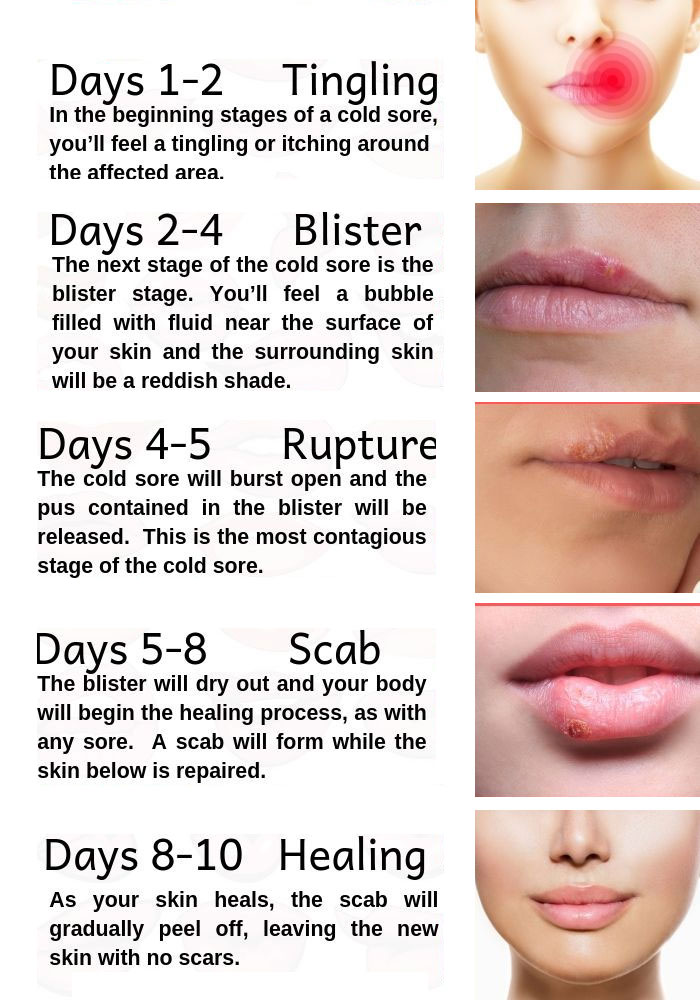Herpes photos in different stages
What does herpes sore look like in different stages? Herpes sore usually present as a grouping of rapidly forming tiny blisters that may fuse together, leading to eventual rupture, with the discharge of fluid followed by crusting. The appearance of this rash varies depending on its location, whether it's in the oral area, around the eyes, near the anus, or on the genitals.
The visual characteristics of a herpes sore can also differ according to the stage of the infection, which includes the prodromal stage (before eruption), vesicular stage (formation of blisters), and ulcerative stage (open sore).
Herpes sores progress through five distinct stages, each with its own characteristic appearance and symptoms:
What does a herpes sore look like in different stages?
Herpes sores typically manifest as a grouping of small, rapidly forming blisters that may coalesce and ultimately rupture, discharging fluid and forming crusts. The appearance of the outbreak can vary depending on its location, whether it be in the oral region, eyes, anal area, or genital region.
The appearance of a herpes sore can indeed vary depending on the stage of the infection. Herpes sores typically go through several stages:
- Prodromal Stage (Pre-Eruption): Before the actual sore appears, many people with herpes experience a prodromal stage. During this phase, you may feel itching, tingling, burning, or pain at the site where the sore will eventually develop. This stage can last for a few hours to a day or more.
- Vesicular Stage (Blistering): The next stage involves the formation of fluid-filled blisters. These blisters are usually small, clear, and filled with a fluid that contains the herpes virus. They can be painful or uncomfortable and tend to group together in clusters.
- Ulcerative Stage (Open Sore): After a few days, the fluid-filled blisters break open, and the sores become ulcers or open sores. These ulcers are often red and can be quite painful. They can also ooze or weep fluids, and they are highly contagious during this stage.
- Crusting and Healing: Following the ulcerative stage, the sores will begin to crust over and gradually heal. The crusts eventually fall off, leaving behind healed skin.

Stage I: Early Herpes Symptoms: Prodrome
Once you contract herpes, whether it's herpes simplex virus type 1 (HSV-1) or herpes simplex virus type 2 (HSV-2), it becomes a lifelong presence within your body. During periods of dormancy, the virus establishes itself within nerve cells located near the spinal cord.
When herpes becomes active again, it follows the nerve pathways and migrates towards the skin's surface, leading to the development of small blister-like structures known as vesicles. These vesicles eventually burst, resulting in the formation of painful, open ulcers that are commonly known as herpes sores.
Initially, individuals infected with the herpes virus often experience sensations of burning, tingling, or numbness in and around the affected area.
This phase typically occurs one day prior to progressing to Stage II and is referred to as the prodrome. In cases of initial infection, flu-like symptoms such as body aches, fever, and fatigue may also manifest during this stage.

Stage II: Blister Formation
Small, red, fluid-filled blisters emerge along the edges of the lips, nose, cheeks, inside the mouth, or on the genital area. These blisters can be painful or tender.
The surrounding skin becomes red, and any fever-like symptoms from Stage I may persist. Stage II usually lasts for approximately one to three days.

Stage III: Blister Rupture
Blisters may merge and subsequently burst, releasing clear or light yellow fluid. After oozing, shallow open sores remain in their place. This stage's duration can range from one to three days.

Stage IV: Drying and Crusting
Shallow open sores begin to dry out and form crusts. Itching may be experienced during this stage. Notably, this stage does not occur in moist areas such as inside the mouth and genitals.

Stage V: Healing and Resolution
The crusts naturally fall off, and the sores gradually heal. Caution is necessary to avoid picking at the crusts or scabs, as this may lead to bleeding and potential scarring. The complete healing process for herpes sores can take some time, often spanning between two and four weeks.

Due to their resemblance to other skin conditions such as acne, contact dermatitis, or ingrown hairs, herpes sores can be easily mistaken for these ailments. To confirm a herpes diagnosis, it is essential to consult with a dermatologist or a sexual health specialist and undergo the necessary testing.
What does herpes sore look like in stages? Herpes outbreaks typically go through several stages, each characterized by specific symptoms and physical changes. It's important to note that the appearance and progression of herpes lesions can vary from person to person. Here's an overview of the stages of a herpes outbreak:
How long do herpes sores last? The duration of herpes sores (also known as herpes lesions or outbreaks) can vary from person to person and may depend on various factors, including the type of herpes virus (HSV-1 or HSV-2), the individual's immune system, and whether or not treatment is administered.

Worry about herpes tranmission? Meet nearby people with herpes

PositiveSingles is one of the most popular dating websites for people suffering from herpes and other STD. It was initiated in 2001. With 1,510,800+ members you are sure to find lots of potentail people around you.
Join and meet nearby people with herpes, browse profiles and chat now!
Positive Singles: The #1 dating site to meet other people with herpes

PositiveSingles is one of the most popular dating websites for people suffering from herpes and other STD. It was initiated in 2001. With 1,510,800+ members you are sure to find lots of potentail people around you.
